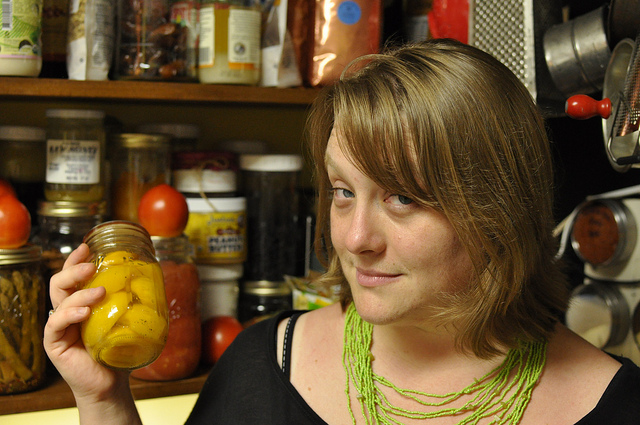Click above to listen in your browser or download the podcast directly (MP3, 24 MB, 50 minutes). Subscribe to the show’s podcast feed to get every episode automatically.
Marisa McClellan puts stuff in jars and it’s delicious. Her Food in Jars blog on canning and preserving went from a side venture alongside a full-time job to her main hub as a food writer. She writes for Food Network and Table Matters (part of Saveur). She conducts dozens of workshops and demonstrations every year. Her first book is Food in Jars: Preserving in Small Batches Year-Round, and she is in the middle of writing her second book, Preserving by the Pint. You want to pickle something? She’s your woman. She talks about how she built a career one jar of jam at a time.
Sponsorships
Your message could be here! And in beautiful audio form, too.
Sponsors underwrite the cost of producing this program, and we love
learning about our sponsors’ products and services so that we can tailor
an informed description for our audience. If you’d like to sponsor the
podcast, contact Lex Friedman at Podlexing for details!
Show Notes
Canning Across America (launched as Canvolution and still on Twitter under that handle) is a loosely organized group that encourages spreading the word about all methods of preserving food. Kim O’Donnel is a key mover, as was my late friend and officemate Kim Ricketts. The Seattle Times ran an article in July about the spread of the movement.
The Cooperative Extensive System,
run by state agricultural colleges, and often funded solely or largely
by the state, spreads information about farming, ranching, and kitchen
skills for canning and other tasks. Through extension, one can become a Master Food Preserver.
Extension programs’ funding has been radically cut in the last few
years just as widespread interest in this basic knowledge has exploded.
Michael Pollan’s Botany of Desire explains that Johnny Appleseed ran orchards out in advance of settlers, who planted trees to make hard cider (low alcohol) and applejack liquor
— both were safe to drink where local water supplies might not have
been. People also tested their apple trees to see if they grew spitters
or tasty versions, as apples are heterozygous
(that’s the right word, not precisely what I said on the podcast). An
apple-tree owner with a tree that produced great-tasting apples would
send cuttings off, get them licensed, and potentially make a lot of
money. That’s how the few varieties of apple that are grown in massive
quantities were found and commercialized.
